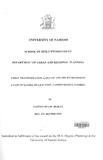| dc.contributor.author | Mubita, Cletius S | |
| dc.date.accessioned | 2013-03-19T09:39:01Z | |
| dc.date.issued | 2011 | |
| dc.identifier.citation | Master of Arts in Planning | en |
| dc.identifier.uri | http://erepository.uonbi.ac.ke:8080/xmlui/handle/123456789/14607 | |
| dc.description.abstract | One of the results of non synchronization of transportation, land use and the environment in developing countries, Namibia included, has been poor attractiveness and maintenance of roads, storm water drainages, urban sprawl and poor solid waste management that has manifested into environmental pollution and degradation. This has been the case in the town of Katima Mulilo where poor road infrastructure has failed to attract investors to the town. On the other hand, the end of civil wars in the region saw the Namibian Government establishing new inter and intra road infrastructures. The new roads and bridges across international boundaries were opened to enhance trade and movement of people such as the Trans Caprivi Highway and Zambezi Bridge.
Those infrastructures have contributed to the economic growth of Katima Mulilo Town on one hand and temporal traffic congestion and environmental degradation on the other. The completion of the Trans Caprivi Highway and Zambezi Bridge in 2004 and 2005 respectively has visualized economic growth by turning Katima Mulilo into a busy stopover town.
This study centers its attention on transportation, land use and environmental degradation within the boundaries of Katima Mulilo Town. It examines the relationship between urban transportation system on one hand and land use and environmental degradation on the other. The findings shows that transportation system is inadequate for the travel need at regional, national and local level while land use and environment are not in harmony with the transportation system of the town. This research study used both primary and secondary data to arrive at those conclusions. The study recommends the tarring of the major arterial roads in the short run while the in the long run it suggest a comprehensive rehabilitation program for all roads and its storm water drainage. The outcomes further suggest the incorporation of garden fuses in the contracts of solid waste management. The study support council’s policy to privatize the solid waste management. The town experiences difficulties in providing sufficient services to its residence, because the town serves as a service center for the neighboring countries and its hinterland. | en |
| dc.description.sponsorship | University of Nairobi | en |
| dc.language.iso | en | en |
| dc.title | Urban transportation, land use and the environment:A case of katima mulilo town, caprivi region, Namibia | en |
| dc.type | Thesis | en |
| local.publisher | School of the built environment Department of urban and regional planning | en |

